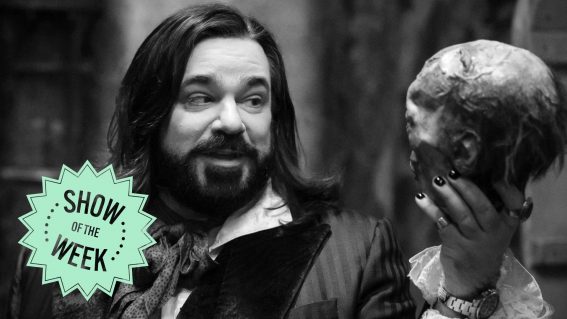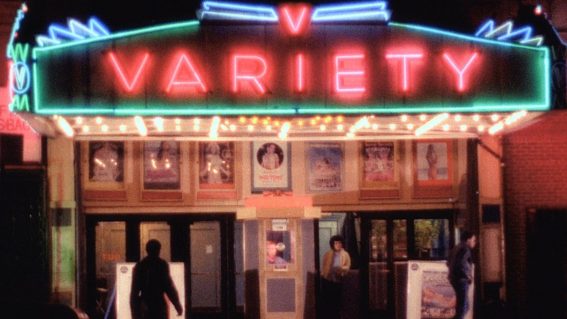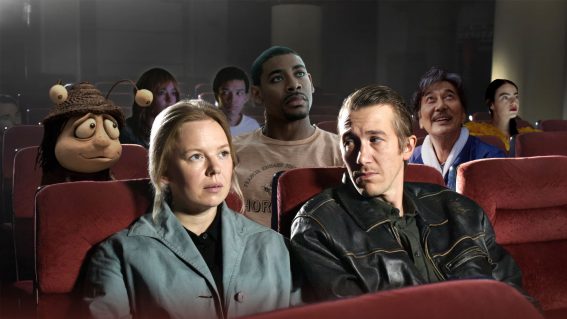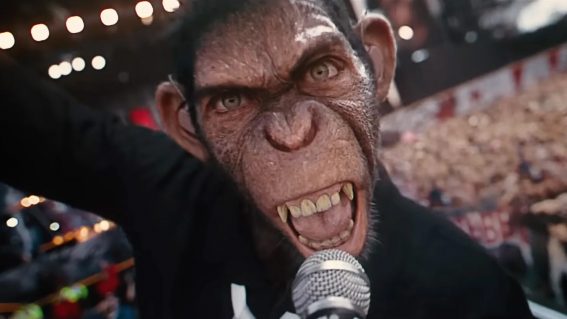The Menu and three more movies that use food to satirise class and privilege
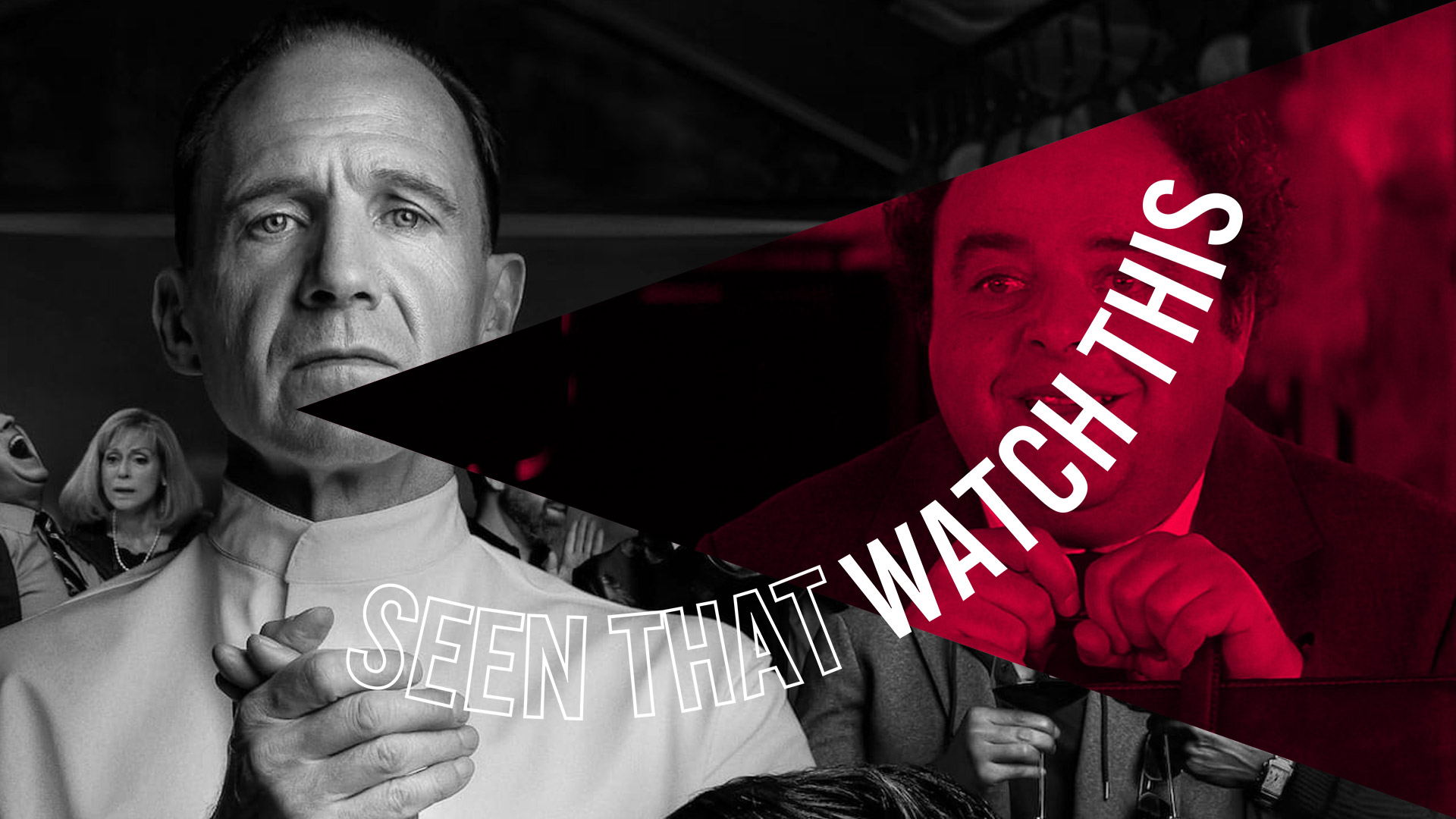
Seen That? Watch This is a weekly column from critic Luke Buckmaster, taking a new release and matching it to comparable works. This week, it’s the delicious horror feast The Menu and other cinematic dishes matching dining experiences with social commentary.
The culture of fine dining—or as the more refined of palate say, “the art of molecular gastronomy”—has been ripe for satire for a long time. Haute cuisine may have been pioneered in the 19th century, but only recently has the word “foraged” truly made its way from the forest to the dinner table. “Reduction” has replaced “syrup” and the best bread these days, of course, is artisanal. Or—according to Ralph Fiennes’ diabolically innovative Chef Slowik in The Menu—no bread at all. Bread “has always been the food of the common man,” he tells his wealthy clientele, pointing out that they are not common—therefore “you get no bread.” Just a plate where the bread should have been.
The film captures the gnarly experiences of an affluent group who travel to an obscenely fancy restaurant—situated on a private island—to have an unforgettable dining experience. They get what they pay for but, like the golden ticket winners who visited Willy Wonka’s Chocolate Factory, might live to regret it…or not live at all. Anya Taylor-Joy’s Margot is the audience surrogate: a last minute plus-one (brought by Nicholas Hoult’s foodie snob) who sees through the bullshit, just wanting a decent feed and some plonk. Instead she gets deconstructed tacos with laser-printed tortillas, and wine not just sourced from a single vineyard but “a single row of vines.”
Director Mark Mylod makes a point about how food is both universal and exclusionary. Everybody needs it to survive, but what ends up on our plates varies wildly according to wealth and privilege. The Menu has loads of bloody mayhem—but it’s also part social commentary and class-based satire. Representing the working class (despite presumably being paid a mint to run an eatery like this?!), Slowik devises a spectacular way for the guests to pay for their privilege. Quoting Martin Luther King late in the runtime, he says freedom “must be demanded by the oppressed,” the film’s politics spilling over from subtext to surface.
The Menu joins a collection of productions that use fine dining to satirise class and status. Scroll for three more great examples—always beware of anything described as a “hors d’oeuvre.”
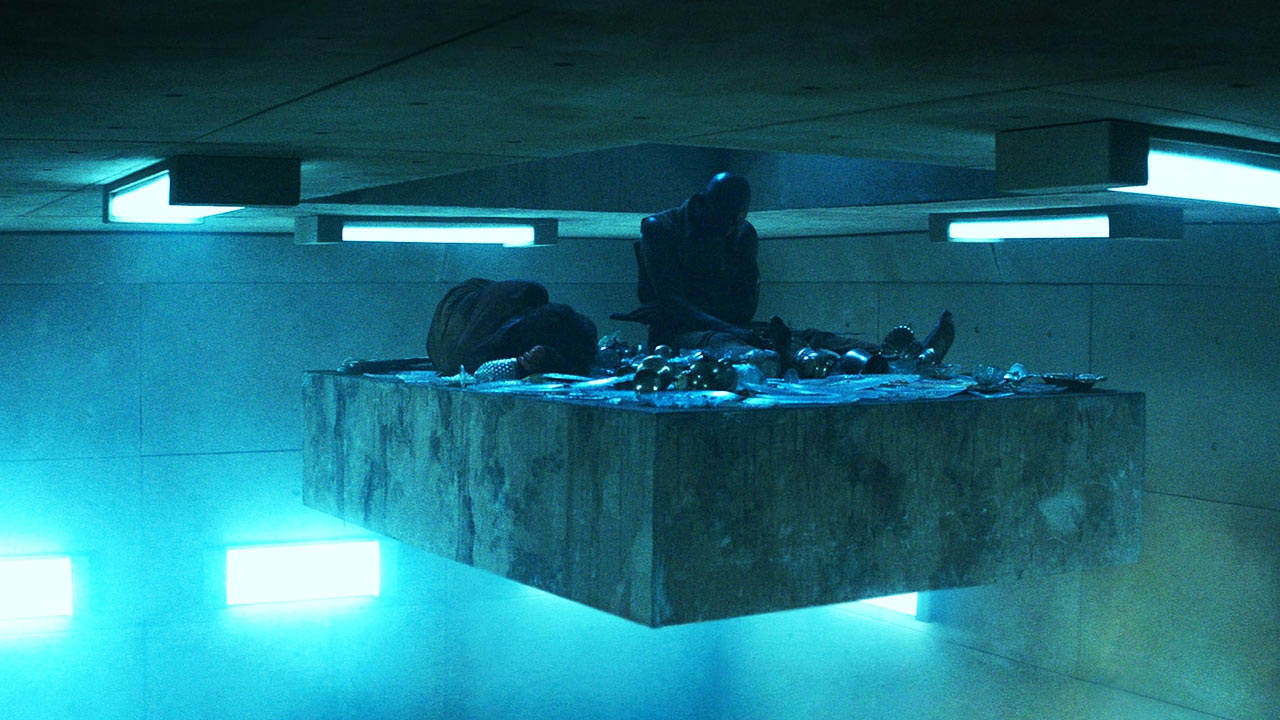
The Platform (2019)
A dirty skyscraper-like prison with a large void in the middle might not sound like a fine dining location. But keep in mind two things. One: people like weird eateries these days, from diners where customers pay for rude service to restaurants where the clientele eat blindfolded. And two: the food presented in Galder Gaztelu-Urrutia’s grisly allegory, which is lowered down the aforementioned void on a platform, begins with a spread fit for a king. There’s lobster, fine meats, glistening vegetables, beautiful cakes. The catch is that the platform begins at the top and stops briefly at each floor. The people high up gorge on amazing food, while the unlucky folk below eat scraps or starve.
Gaztelu-Urrutia uses this premise to explore wealth inequality symbolically and spatially. The film dramatically encapsulates theories such as trickle-down economics, which conservatives often latch onto in order to argue that benefits experienced by those at the top of the pyramid filter down to those on the bottom (sadly, in a world of extreme inequality, this is not the case). The plot pivots around an anti-establishmentarian, Ivan Massagué’s Goreng, who has big ideas about how to beat the system and tries to work out a way to provide food for all. From his attempts a unique motto is borne: “the panna cotta is the message.”
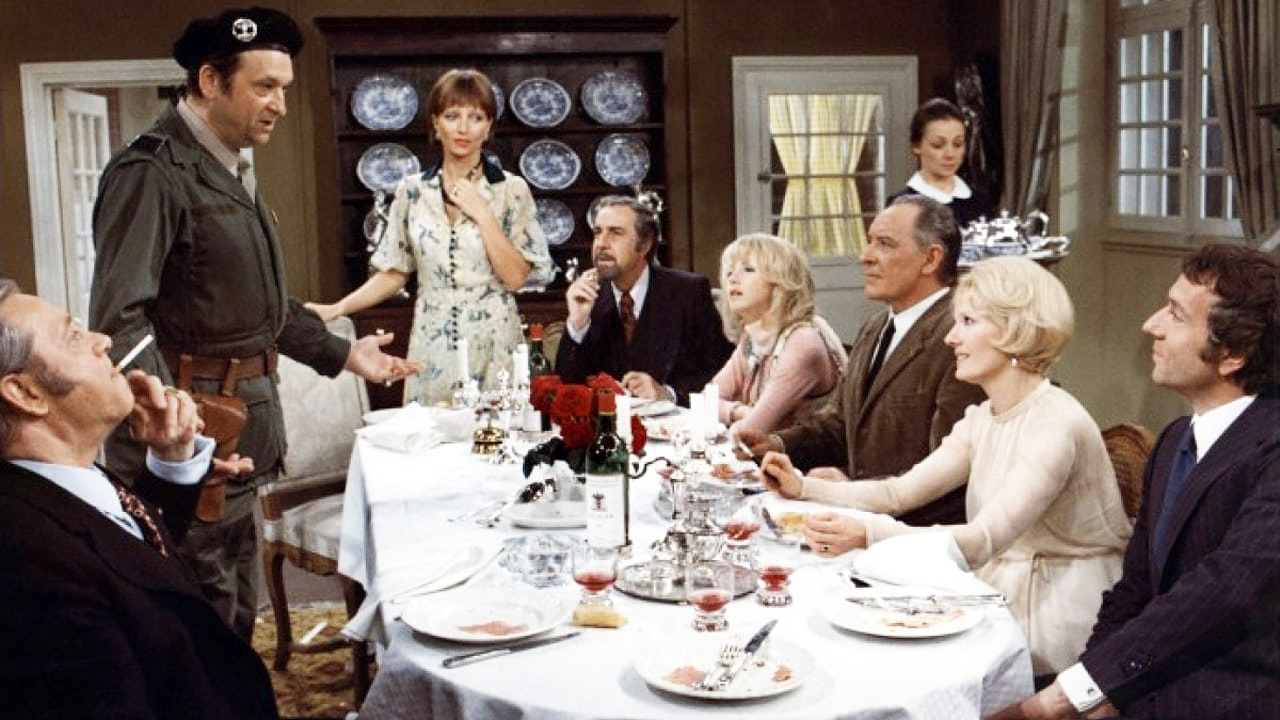
The Discreet Charm of the Bourgeoisie (1972)
The Discreet Charm of the Bourgeoisie
In one scene in Luis Buñuel’s characteristically idiosyncratic classic, a hoity-toity socialite prepares a martini then summons his driver to drink it in front of his friends. The well-to-do man correctly predicts this “commoner” will consume the beverage incorrectly, in one big gulp, and points this out as soon as he leaves. One of his friends remarks: “no system will ever enable the masses to acquire refinement.” This line reflects Buñuel’s condemnation of bourgeoisie society and what he saw as the repulsive snobbery of the middle and upper class, which are recurring themes across his work.
Core to the film is a high concept indicative of the auteur’s famously surreal style. The handful of characters the story (which is more a series of incidents than a single narrative) revolves around always meet up for dinner, but like Godot the food never arrives. They get the wrong date, or are put off their meal, or an unexpected event occurs just before plates hit the table. It’s sublimely and supremely strange, with plenty of absurd deviations.
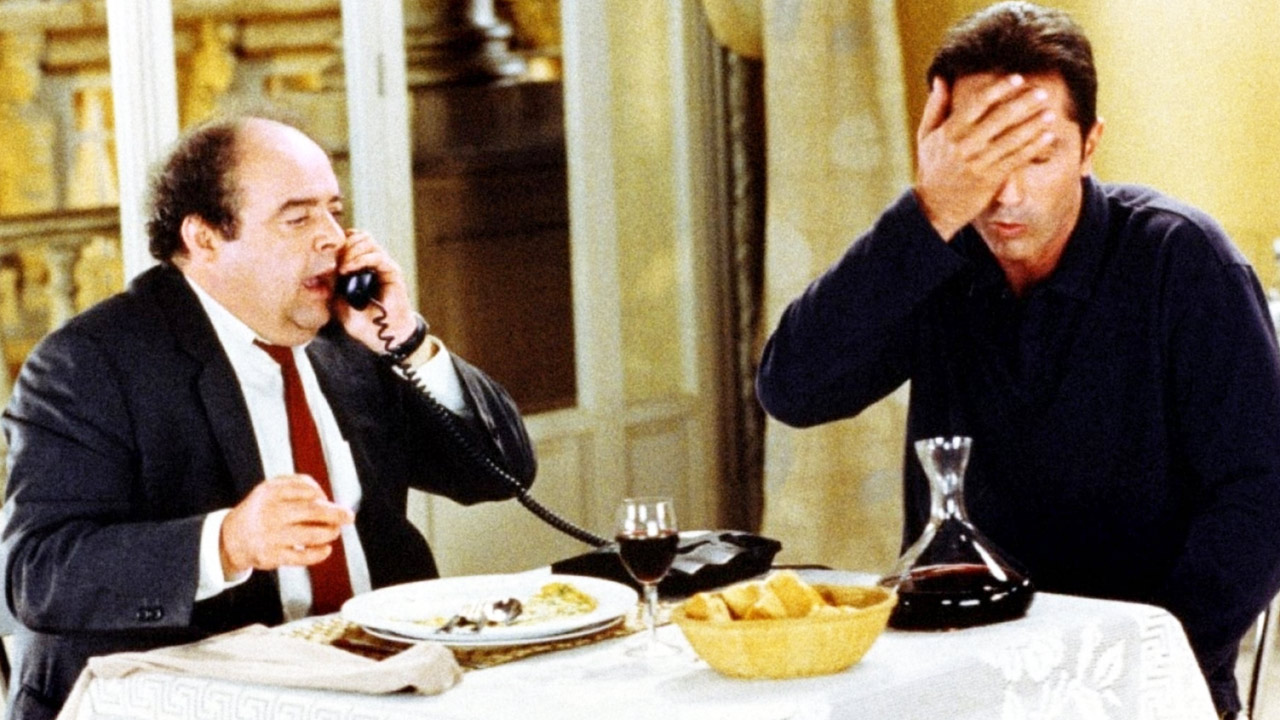
The Dinner Game (1998)
The Dinner Game
Francis Veber’s uncomfortably sharp farce, which takes place almost entirely in an apartment, belongs to a canon of pictures that explore the twisted recreations of the middle class. Several have “game” in their title i.e. The Game, The Rules of the Game and Game Night. In Veber’s film, rich Frenchmen gather every week for a dinner party in which each of them brings an idiot for the rest to laugh at. François Pignon (Jacques Villeret) is invited by Pierre Brochant (Thierry Lhermitte) though we never see the actual dinner—only the madness engulfing Pierre’s life when François visits his home, believing he’s there for a potential book deal.
We’ve caught Pierre at a bad time: his back is out and his marriage is on the rocks. The dim-witted but decent-hearted François attempts to help him, embroiling himself in a range of scenarios that ultimately—and very amusingly—make things worse. You don’t feel sorry for Pierre; the bastard had it coming. Tinkering at the edges of the film is a suggestion it’s not just him, or his friends, but an entire class of people—especially men—who take glee in looking down upon the less fortunate.










